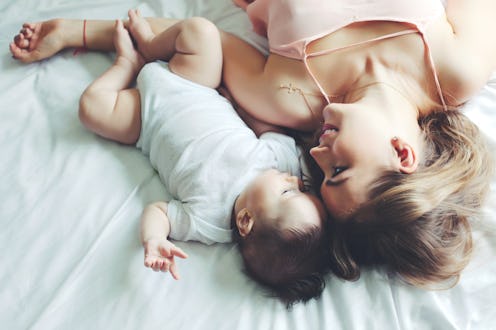
If you've ever walked past a baby in a stroller, or held a friend's newborn and marveled at the rush of emotions overtaking your body, you're definitely not alone. For many people, looking at a baby can trigger a whole host of instincts and other pleasant physical and emotional changes. But it's definitely not something everyone experiences.
It can be tough for some to imagine feeling a rush of emotions towards a baby, especially since not everyone has maternal instincts. And that's OK. If you feel like you don't want kids, or don't enjoy being around babies, that doesn't mean there's something wrong with you — or even that you couldn't take care of a baby, if you chose to do so.
That said, for some folks, seeing a baby can make them feel all warm and fuzzy inside, and it often kicks their emotions into high gear. "We often want to smile at them, hold them, kiss, and snuggle them," Jenny Maenpaa, LCSW, EDM, NYC-based psychotherapist, tells Bustle.
But why might some people have such a powerful reaction, even towards babies they don't know? Read on below for a few things that can happen to a woman's body when she sees a baby, according to an expert.
1You Might Want To Have A Baby Of Your Own
"Some researchers have theorized that the code for mothering behavior exists in the brain even before a woman has children, likening it to an undiscovered room in a house just waiting to be unlocked," Maenpaa says. So for some, seeing a baby can trigger a desire to have kids.
"It’s almost like the instincts lie dormant in you until you see a baby," she says, "because your brain thinks this might be a cue that change is coming in some way."
But even if you don't have or want kids of your own, Maenpaa says this theory can still help explain why you may be primed to express maternal care.
2You May Want To Hold Them
Caring for a baby, whether just in passing, for an extended period of time, or by giving birth to your own, can begin to create neural pathways towards that "undiscovered room" of maternal instincts, Maenpaa says. And this may explain the excited way in which many people react when around them.
For example, you might smile when you see a baby, have a strong desire to hold them, or even decide that you would, in fact, like to have a kid of your own.
3They Can Reduce Stress Levels
If you have a baby of your own, or are helping a friend take care of theirs, you might notice that holding them helps reduce your stress levels. And the feeling can be mutual.
"Holding babies and making skin-to-skin contact helps them cry less and sleep better, which in turn can facilitate brain development," Maenpaa says. "In return, it also helps reduce stress levels in the adults holding them, making them more sensitive to the babies’ cues and responsive to their needs."
4"Bonding" Hormones Are Released
Holding a baby can also release oxytocin, "which is a hormone that increases bonding by releasing feelings of love and affection," Maenpaa says. This hormone helps you bond with your own baby, but can also make you feel closer and more loving towards someone else's.
5You Might Feel The Need To Take Care Of Them
"All baby humans share certain traits when they’re born, like big eyes, round faces, big foreheads, button noses, and small chins, because those are more likely to trigger a biological response in the adults around them," Maenpaa says.
Basically, nature made babies cute on purpose so we'd be more willing to pitch in and take care of them. And as a fun side fact, the same is true for baby animals.
As Maenpaa says, "These feelings extend to baby cats and dogs, as well as humans, which is why you often have the same reaction to a baby as you do a kitten or puppy. Even if you don’t want a baby of your own right this second, these feelings are natural and biologically driven.”
6Dopamine Is Released
Seeing a baby can also release dopamine in the brain, which is another reason why you might feel the need to pick a baby up and hold them. And there's an interesting reason for that.
"Part of the reason that this can happen with a baby that is not your own is because humans are social [...] creatures, and throughout history we took care of one another’s children as part of a community," Maenpaa says. "These behaviors increase the likelihood of survival."
7You Might Want To Protect Them
"Research has shown that children who have not had enough physical and emotional attention are at higher risk for behavioral, emotional, and social problems as they age," Maenpaa says, which is another reason we might feel drawn to hold and protect them.
"Evolution has allowed us to learn the behaviors necessary to engage with babies so that they grow up into high-functioning adults," she says, "so don’t worry if you don’t have that natural instinct to fawn over every baby you see."
It's a skill you can learn over time, if you so choose. But also something that's amazingly innate in many people. You may find that you naturally want to pick up and hold babies, take care of them, or even want to have one of your own.